Color
I have spent a lot of the past three weeks thinking about color.
Specifically, two colors: pink, and blue.
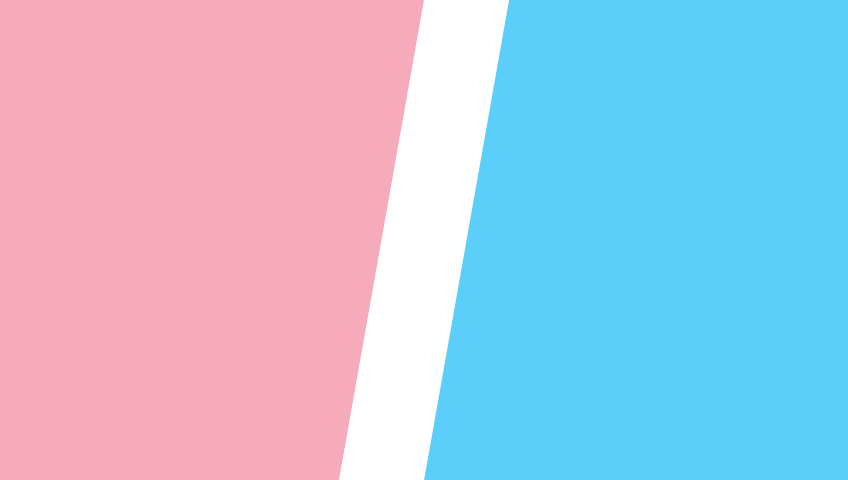
When you watch BNA, you will see a lot of pink and blue. It's a natural consequence of two decisions about the way the show is colored. Most light sources in the show have been decided to shine pink light. The light from sunsets, from sunrises, and from neon lights in the dead of night throughout the setting of Anima City, are all pink or close to it. In real life, sunsets and sunrises are many colors, and neon lights come in all sorts of different colors. But Anima City is very pink. The one constant exception to this pink light rule is the moon (which is usually full or close to it). The moon reflects blue light. These two colors form a sharp contrast, and make for very dramatic lighting throughout the show. I think it's beautifully done. Anima City is gorgeous, and the lights are no small part why.
It's not just the lighting though. It's also in the character design. There are two main characters, Shirou, a male wolf-type beastfolk, and Michiru, a human girl who awakes one day to discover she has unexpectedly and suddenly become a tanuki-type beastfolk. There is also another character who figures very centrally to Michiru's arc, her childhood friend Nazuna, also a human girl who unexpectedly becomes a fox-type beastfolk. Shirou's main coloration is blue. Nazuna's main coloration is pink. Michiru's coloration is... both, and neither. At times, the brown of her fur looks almost pink, and her silver hair and tail at times look blue. But they're also never quite either. Her irises after becoming beastfolk are a mix of pink and blue.
It's not just in the character design, either. The OP features pink and blue heavily in its more stylized portions. The text is, with the exception of the title card, all pink. The ED is even more stylized, and is almost exclusively pink and blue.
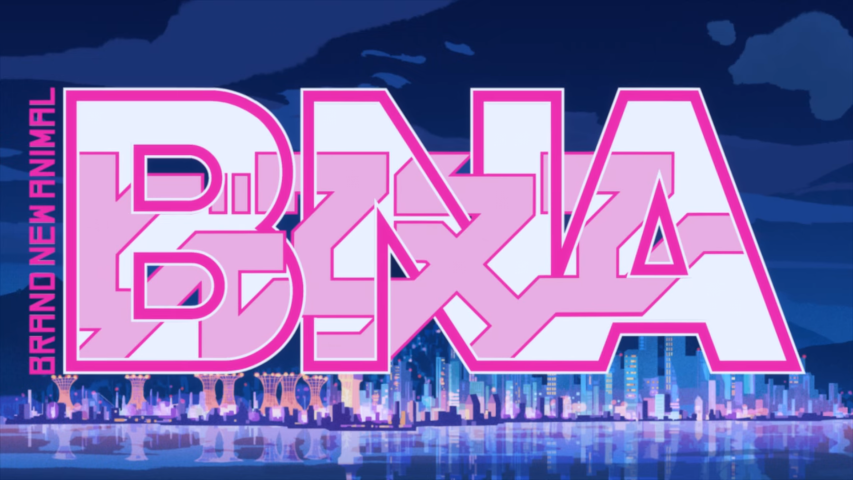
I am writing about color now, because I feel like if I do not write about color, I will simply go mad. My brain has spent too long obsessing about color for the past three weeks for me not to talk about color.
Pink and blue are common colors in cyberpunk settings, in part because they are such strong contrasts with one another. If I were to google image search "cyberpunk pc build", I get a wealth of pictures featuring PCs with RGB lights built in, often shining pink and blue. Neon is closely associated with the cyberpunk aesthetic, and neon pink is a bold lighting choice that is frequently used in these settings. Blue often is used to signify a seemingly endless twilight and nighttime in cyberpunk settings. BNA is almost certainly not as embedded in cyberpunk as Studio Trigger's upcoming anime, Cyberpunk Nightrunners, will be. However, it does seem to have cyberpunk influences. For one, Anima City, a dense metropolis seemingly dominated by one huge corporation (Sylvasta Pharmaceuticals), could be a proto-cyberpunk setting itself. And themes of transformation are common among cyberpunk stories. Nobody's running around with decks and augmenting their bodies with fancy robot tech, but there's a relationship between those stories and BNA.
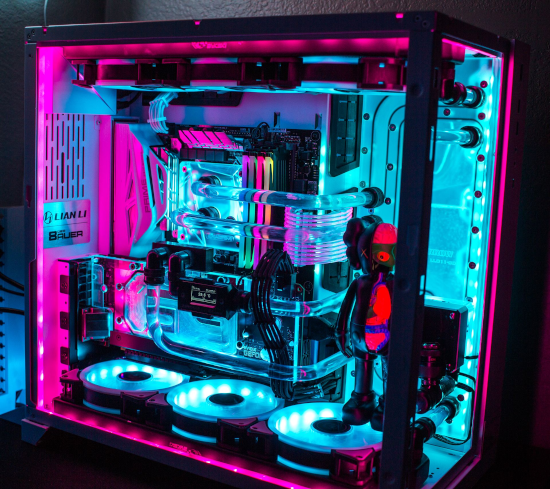
Pink and blue are also, at least in American culture where I'm writing from, heavily associated with gender. Americans learn from a very young age that "blue == boy" and "pink == girl", and these colors are used extensively to signal this difference. Baby clothing (and the phenomenon of "gender reveal" parties for newborns) use this blatantly, but so do toys, clothing as you grow up, and more throughout our society. It is for this reason that the trans flag features stripes of blue, pink, white, pink, and blue; the blues and pinks are explicit references to these cultural understandings of these colors.
The claim
One may interpret Michiru's character arc as a trans person learning to understand themselves and their body. In her specific case, she begins from a place of deep self-loathing and finishes at a place of full self-acceptance.
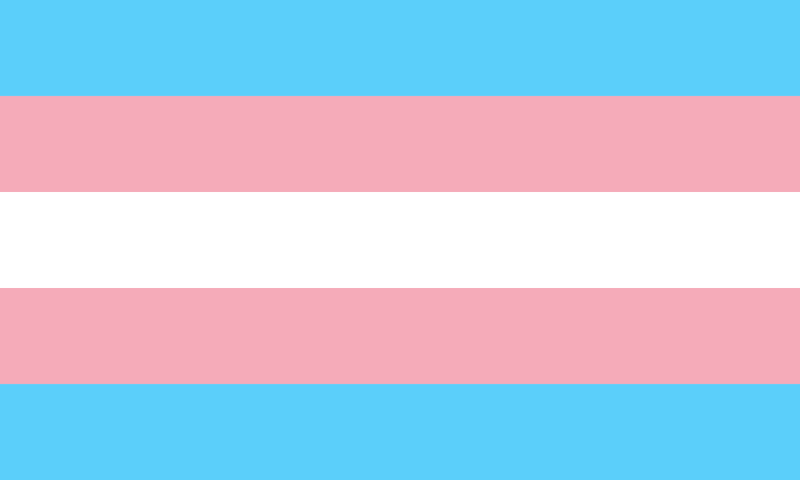
I'm not saying that Yoshinari Yoh and Studio Trigger at large wrote BNA intending Michiru's arc to be a parallel to a trans experience. It's certainly possible, there's nothing I've found in interviews and such that directly preclude this reading. And in fact, in some interviews, things like gender are gestured towards as having a deeper symbolic meaning. Certainly, Yoshinari is concerned with change and transformation in some form. He says as much in the quote about the show's title above, and there are comments about the setting of the anime in Spring (a time of change and new beginnings) being intentional. I think it's interesting that Yoshinari was credited with the intense focus on pink and blue as colors in this work, and that it was originally envisioned as more of a high fantasy setting than a cyberpunk one (which would have eliminated the "we just picked cyberpunk colors" theory).
However, I also see signs that the show may have been more interested in discussing and deconstructing gender norms with a specific mind towards something like a "women's empowerment" theme. Shirou at times seems weirdly normative with ideas of chivalry and protecting "the beastwomen and children", which Michiru challenges. There is some mention towards the end about Michiru deciding for herself what is "ladylike". Personally, if the show seriously intended to discuss gender norms in that way outright, I don't think it did a great job of it -- it just doesn't come up very often. But there's some evidence for that interpretation, and it could go some ways toward explaining the emphasis on pink and blue throughout the show. In any case, whether or not Trigger intended this reading, I think one can find it all the same.
What is my investment in this?
I feel like it's valuable to talk about where I'm coming from with this. If I were to make a claim that a story has trans parallels and no trans folks felt the same way, it would be at best an odd claim for me to make. I want to emphasize that, while I'm bringing this claim up and explaining it, what I really want is to hear the perspectives of trans folks, not to push my own ideas. This is a personal blog, I am not an authority on much of anything, and I mostly expect the folks who will read this are merely close friends of mine.
This being said, BNA and, in particular, Michiru's character arc resonated with me. And I could make a post about what precise ways it did that. This post is not that, though. I have mentioned in passing, let alone talked in depth, about the aspects of my identity with which it resonates to a single digit number of people before now. It touches on something very deeply personal to me, and I am extremely private about it. I made the point earlier that I don't know that Trigger were trying to write this as a trans parallel, though it's not impossible. However, it's too far-fetched for me to believe that they intentionally wrote it as any kind of therian manifesto.
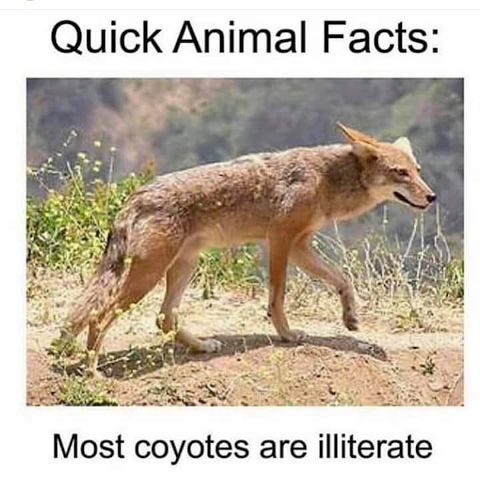
Given that Michiru's arc touches on transformation (into an animal, no less) and change, I don't find it surprising that it did speak to me some. The ways it speaks to me, however, are significantly deeper than I would have expected. I can believe that, due to parallels between therian matters and trans matters, they did intentionally write it as a trans storyline and the particular shape they gave this story naturally fell into my wheelhouse. Even if not, it still wouldn't be too unbelievable that they stumbled into matters relevant to anybody who's given something like their own gender serious consideration because they started from a point where gender was already being reflected on. Hence, in this post, I focus on gender and a trans narrative, not so much a therian one.
But, to put my cards on the table, I'm paying attention to this aspect largely because it speaks to me on what I see as an at least somewhat related note: the ways I have thought about animal-ness and my relationship to it. In brief parts, the parts that I think are the lynchpin of the argument that Michiru is trans, I do go into more detail about my own feelings and thoughts. However, I am still fairly private about this matter. As a general rule, I usually only talk about this stuff with either the closest of friends or others who are therians or are personally ruminating on therianthropy themselves. Please keep that in mind if you would like to discuss this particular aspect further.
So, Michiru
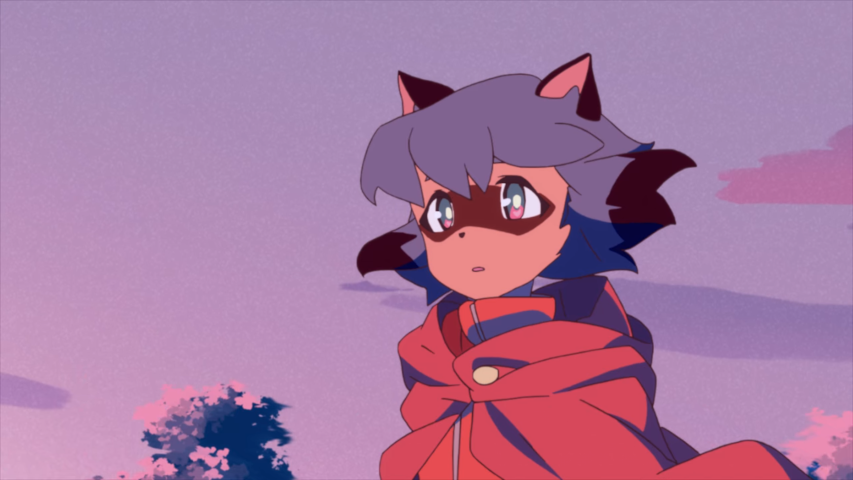
In order to provide evidence for the claim I am making, my approach will be to proceed roughly linearly through the story (which, with the exception of a few things that happen in flashbacks before the first episode, is also episode order). I focus primarily on moments where we catch a glimpse of what Michiru is thinking about herself. Often, these moments come in conversations with Shirou, her foil throughout the story, and so I also highlight moments we see how Shirou perceives Michiru, and their relationship overall. I think their father-daughter dynamic is particularly well done and plays some role in Michiru's development.
Before the first episode
BNA opens with a grim view of Michiru's personal circumstances. She is in hiding, using a large red cloak to obscure all details of her appearance. One year ago, we'll later learn, Michiru had been a human and unexpectedly turned into a tanuki. Though there are tanuki-type beastfolk, in this world, people know if they're beastfolk from birth. Between that transformation and now, Michiru has spent a year hiding in her bedroom. We only get small flashes of this time period, but Michiru is depicted as... deeply depressed in this state. She never saw any perosn (besides, we can assume, her parents; she is 16 during these flashbacks, after all). She spent her time staring at old pictures, staring out the window, and so on. Shortly before the point we join her in the main story, a flashback shows Michiru looking up resources online about the one place in the world beastfolk aren't actively persecuted: Anima City.
"Runaway Raccoon"
So Michiru, unable to bear her seemingly endless imprisonment inside her own home, writes a short note to her parents and runs away, seeking to return to some level of life like she knew before becoming beastfolk. We join her near the end of her journey to Anima City, just as she hitches a ride atop a bus which will conveniently pass close to the city. Along the ride, humans patrolling the area (specifically to catch beastfolk attempting to flee to Anima City) spot her and try to kill her, with crossbows and other weapons. Fortunately for Michiru, other beastfolk are also patrolling the area, and save her, with a promise to ferry her across the unspecified body of water that separates the beastfolk haven from the rest of Japan.
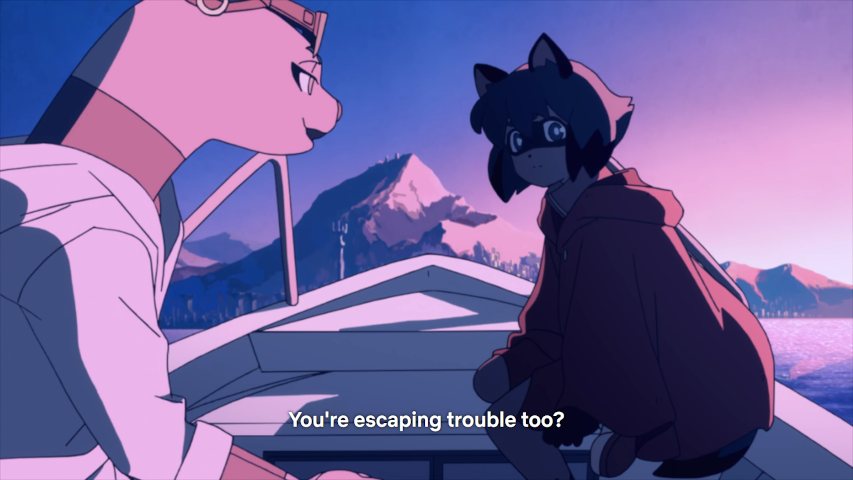
Upon reaching Anima City, the story truly begins. Michiru's first scene in the city is her stumbling into a huge festival, celebrating the city's founding (and specifically its designation as a haven for beastfolk) 10 years prior. For the first time since her transformation, and likely ever, Michiru finds herself surrounded by other beastfolk. And that's when it finally hits her. Michiru casts off her cloak, her only method of hiding her ears and tail away from prying eyes, throwing it to the crowds. ("I don't have to hide who I am anymore!")
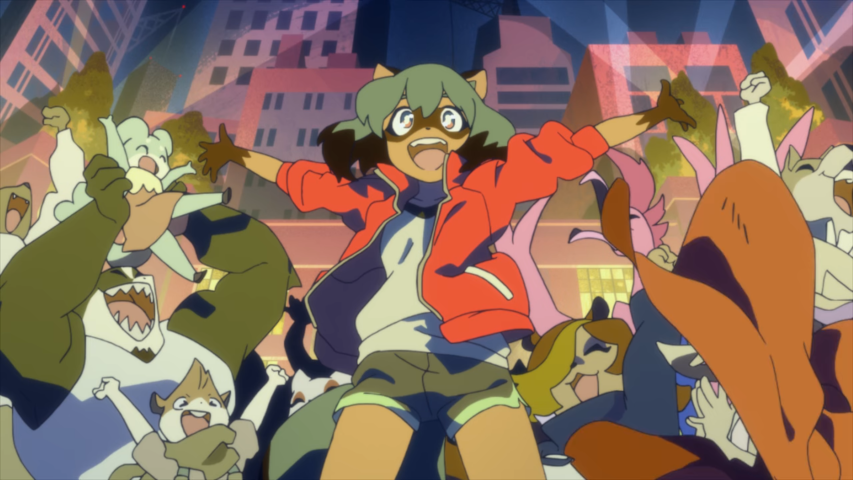
What follows is approximately thirty seconds where the only sounds are celebratory music, crowd noises (or at least, they're supposed to be there, but in the English dub unfortunately this was not recreated), and Michiru giddily laughing while she explores the festival and its delights. To me, that realization, that literal "throwing away the way I hide myself", the... nothing but giggling for thirty seconds, felt like a form of euphoria. Suddenly, Michiru felt comfortable as herself in a way she had not been for the past year. At a minimum, the imagery strikes true, I think, to many a queer person's first experience at something like a pride parade.
"Rabbit Town"
The festival ends, and Michiru has wound up meeting Shirou. Shirou, recognizing that Michiru is a newcomer and has no place to go, offers to take her to a place that helps newcomers like her, the "Beastman Cooperative". As they begin to walk, Michiru looks around, and realizes that everyone around her looks like a human. Shirou elaborates: the beastfolk are not gone. All beastfolk can transform at will, between a human presentation, and an (anthropomorphic) animal presentation. Normally, unless they have a reason to do otherwise, beastfolk present as human. Michiru does not know how to conduct this transformation. Outwardly, Michiru whines about others not always presenting as animals, and Shirou chastises her: "That is really such a human thing to say." They banter some, but as they move on, Shirou turns away. And Michiru glances back at the human-presenting beastfolk around. And for just a moment, in her eyes, there's... a despondence. A look that, she's still the weird one out after all, before she resigns to it and follows behind.
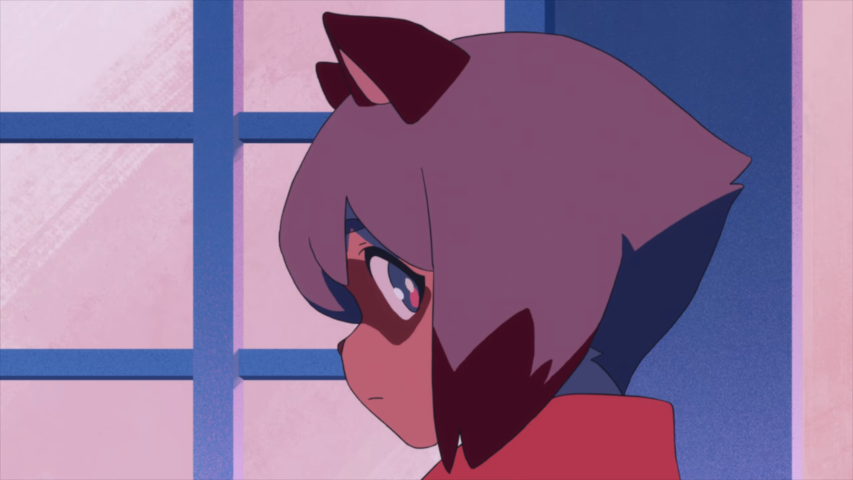
At the co-op, the staff uses a diagnostic test to confirm that, despite Michiru's protestations of having once been human, she is now unequivocally beastfolk. Shirou dismisses the idea that she could have transformed: "Impossible. It simply can't happen. A human is a human, a beastman is a beastman. You can't just change suddenly."
As an aside, I will here point out that Director Yoshinari Yoh has been quoted as describing the city (and I think it's clear to infer Shirou in this as well) as being composed of "those who are bound by the past in that they have a fixed mind of who they are". Part of the role of the story is to refute this, as Michiru "finds her own way". Shirou's arc involves him, in many places, being confronted with prejudices he knowingly or not has, and then him grappling with that and adjusting. Unrelatedly, I've pointed out to others before in private conversation that, it turns out, you can just replace words like "beastman" and "human" in your head. Like, what if "beastman" was "woman" and "human" was "man"? Haha, what a funny thing to think about.
Michiru decides to frame her transformation as like some sort of disease, heretofore unheard of, that she names "Beastman-itis". Part of her rationale for coming to Anima City, it seems, is to seek out a cure for Beastman-itis. Not unlike the experience of some self-loathing queer folk, who grapple with things like their sexuality and their gender and just want to be "normal". If this world had a conversion therapy equivalent, I think Michiru might try it, is what I'm saying.
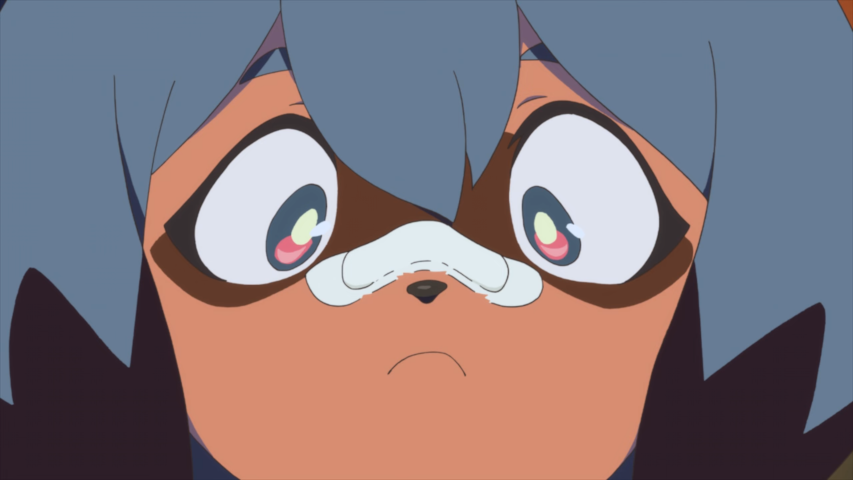
Michiru's opinions about her state of affairs are pretty openly stated here, but I think we can hear it again at the end of this episode. Shirou is an advisor to the mayor, and from time to time investigates certain things quietly for her. Michiru, meanwhile, in an effort to retrieve a stolen wallet that holds an ID card which can prove she was once human, ends up in the middle of a beastfolk trafficking operation. Fortunately, Shirou was already investigating it, and is able to save her. This is one of those times that, if the show has something to say about gender norms, it does so explicitly: Shirou is pretty patriarchal here. For one, he'll fight the women beastfolk running the operation despite his reservations about fighting women, but only because what they're doing is so wrong.
There's actually a pivotal difference between the sub and dub here, which I think begins to speak to why I, having watched the dub primarily, didn't even register this moment as about gender norms. In the dub, Shirou says he "protects beastmen and women. And the children"; in the sub, he protects "women and child beastmen". Michiru goes in on him saying that he protects women and children, and "are you trying to tell me, that men are the great ones?!" which... just doesn't make as much sense in the dub? Strictly speaking, I would guess this is maybe a flubbed translation, but for my own purposes the dub eliminating that thread here allows more focus on the other aspects of this moment that I think are interesting. Michiru has obtained the ID card that proves she really used to be a human, and shoves it in his face, forcing him to acknowledge something he was wrong about at the beginning of the episode. But the lines she ends the episode on are the real thing to highlight here: "I hate this stupid town and I hate beatmen! I'm gonna cure this disease and leave this town as soon as I can! Uggh!"
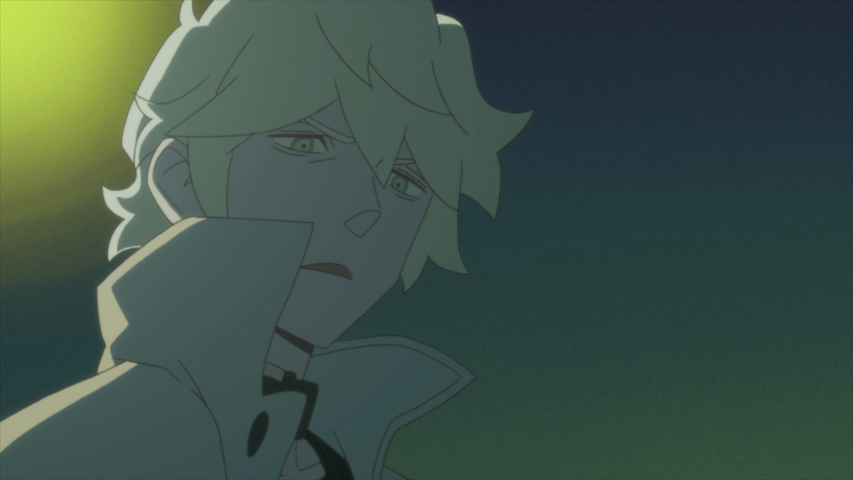
To me, this entire outburst is particularly heavy. I cry, even on what is now the 6th or 7th time rewatching it. It reads to me like somebody who feels scared, and powerless, and can't understand what is happening to them. To step back a bit, if Shirou hadn't made it in time, Michiru would have been sold as property. She would've been forced back into the human world in an even worse position than fleeing people actively trying to take her life. She has every right to be scared in that moment, and really she had to do a lot to save herself. Shirou only came in at the last second. But, in particular the outburst, and that final line, reads to me as somebody lashing out, saying anything they can to hit the other person, whether they mean it or not. Because what else can she do? She almost got sold into slavery. I think you can read into Shirou's gaping mouth lack-of-response the feeling of "I wish you wouldn't say such things but, I get it." Michiru doesn't see herself as beastfolk, despite the fact she certainly seems to be one now. What could you even say?
"Rhino Melancholy"
We end up revisiting this idea in the next episode, and this is the beginning of what I see as Michiru's actual growth as a character. After Shirou again saves Michiru, this time from members of a gang, an explosion happens in the city's hospital. Shirou runs off to investigate, and Michiru follows, despite his protestations that it's unsafe. And they have this exchange:
M: "Then I'll admit it. I know that I was born a human. But I'll admit that right now, I'm a beastman." S: "Why do you say that?" M: "Well you did say that you'd protect the beastmen, didn't you? Well, then you're going to have to protect me. Because I'm also a beastman." *beat* S: *smirks* "You're such a pain"
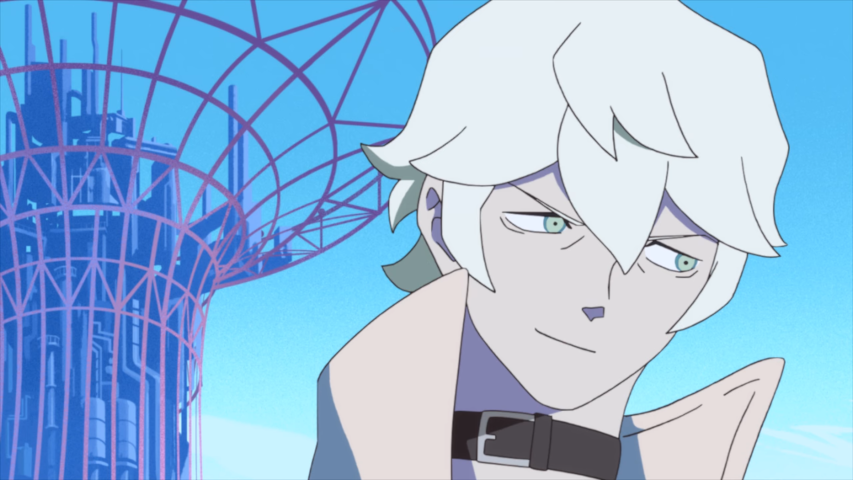
I draw attention particularly to the end of the exchange, when Shirou smirks at Michiru. It's a perfectly normal finish to a completely ordinary banter scene between a girl and her increasingly father-ish figure at this point in the story. But, I think it's important to look at this moment in light of Shirou's character.
Time and again through the show, we see Shirou and his misgivings about humans. I've seen people discussing it as his "hatred" for humans, or similar, which I think is the word people use because that's what Michiru describes it as. I'd like to push back on that slightly -- or at the very least, the judgment that Shirou would be wrong to distrust and hate humans. After all, for whatever you think of the overall plot of the show, the text is that of an oppressed people (the beastfolk) fighting against oppressors who seek to destroy them and their culture, ending with them foiling a literal attempt at genocide against them. I think it's fair to point out the weaknesses in this as an overall plot, and I do in the post about the overall plot despite my general enthusiasm for it, but I think it's a different discussion to have when talking about Shirou himself. After all, we only see him interact with three "humans" directly -- Sylvasta (who technically isn't a human but certainly presents as one), the man enacting genocide against the beastfolk; Nazuna, who stole Shirou's identity as a pawn in the genocide plot; and Michiru. With Alan and Nazuna, we don't really have much of a chance to see anything but a justified response to individuals being completely worthy of violent condemnation.
So in this moment, we reflect on Shirou's view of the other human he knows, Michiru. He didn't exactly believe her when she said she was a human initially, but he did comment on the way she talked about things as being "such a human thing to say". He rejected the idea that she could be a human when she keeps pressing it, until she shows him her student ID with the species designation: human. I'd be loathe to not point out, he could've rejected it as falsified right there -- it's just a high school ID card, that can be faked -- but instead he just chooses to believe her. And when she keeps trying to help and getting herself in sticky situations, the lectures he gives her aren't about humans butting out of beastfolk problems. Right before this exchange, he tells Michiru to run away for her own safety, and doesn't challenge at all the idea that she would still have an interest and desire to help. In fact, after the events of "Rabbit Town", he doesn't say anything about her helping the beastfolk children when Michiru throws her ID at him. He can only stand in shock that somebody challenged him on anything.
It's certainly possible to read Shirou, in this moment now with the smirk, as happy that Michiru is calling herself beastfolk, because it gives him cover to think of her as fundamentally beastfolk and not a human specifically so that he doesn't have to extend his hatred of humans to her as well. I'll keep coming back to this, because as I said at the top, how Shirou views Michiru is a recurring theme in his character arc. But I choose to view this exchange slightly differently. I also agree that, I think Shirou sees Michiru as fundamentally beastfolk, but I think he does that because of her actions. She keeps involving herself in these problems that, if she were just a human in a beastfolk body, she would probably see as not her problem. In "Runaway Raccoon", she follows the explosion set by the terrorists to try to kill him while he is pursuing them. In "Rabbit Town", she tries to teach the beastfolk children to read and write, and eventually frees them herself. And now, in "Rhino Melancholy", she first helped investigate Sylvasta as part of defusing the bombs across the city, only to run headlong once again into an explosion because trouble has come to the city. Why does she do these things? Is it because she's selfish and wants a "cure"? Is it because she's just nice? Or is it, perhaps, because she sees herself in these problems now, and understands she has skin in the game? After all, there's no guarantee that there ever could be a "cure" for her "disease"; if she had to live the rest of her life as beastfolk, how would she handle it? Shirou, cold as he may be to her outwardly, still is a social worker for the co-op. It is kinda his job to worry about these sorts of things. So when Shirou smirks, what I see is Shirou happy that Michiru is beginning to accept herself and her new body. Her body is telling her something her mind hasn't been able to accept yet; inside, she's something other than what she was born and raised as.
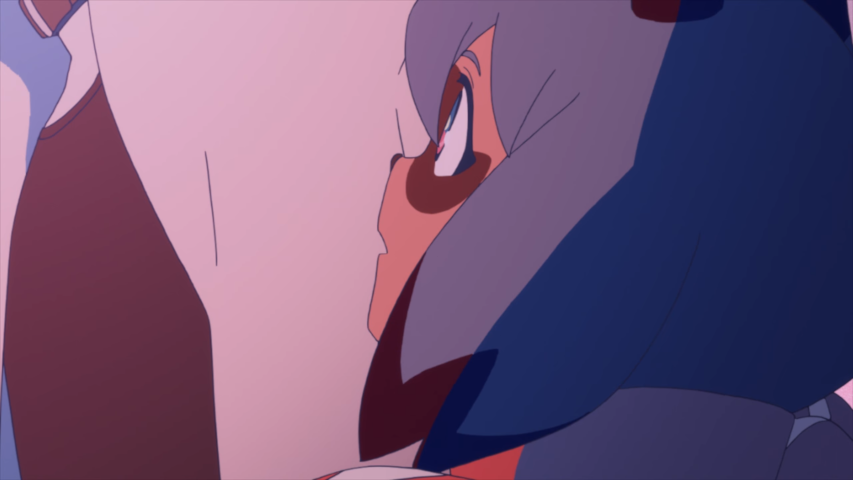
On its own, I don't think this moment is enough to sell this interpretation. But, as we keep revisiting this theme of Shirou's view of Michiru, what I see is Shirou checking in on her feelings, over and over. What does she think of herself? What does she think of Anima City? Does she want to leave? And being, frankly, quiet, contemplative, and thoughtful about her answers. He doesn't push any thoughts onto her after he accepts that she had once been human, but lets her decide for herself how she feels. He does, however, make sure she keeps revisiting these ideas, and works through them.
"Dolphin Daydream"
Through these first three episodes, it's very clearly established that, unlike the other beastfolk, Michiru does not know how to transform back into a human form. Lead Writer Nakashima Kazuki commented about this that, they wanted to communicate visually that something was different about her from what had come before, from Shirou and the other beastfolk, and they chose to do this by not giving her the option to transform back. But in the next episode, "Dolphin Daydream", this trick gets more complicated. Michiru ends up meeting a new beastfolk, Nina, a young dolphin girl who happens to be the daughter of the main crime boss in town. Michiru initially mistakes her for a human, and Nina fawns over Michiru for her willingness to talk about the world outside Anima City.
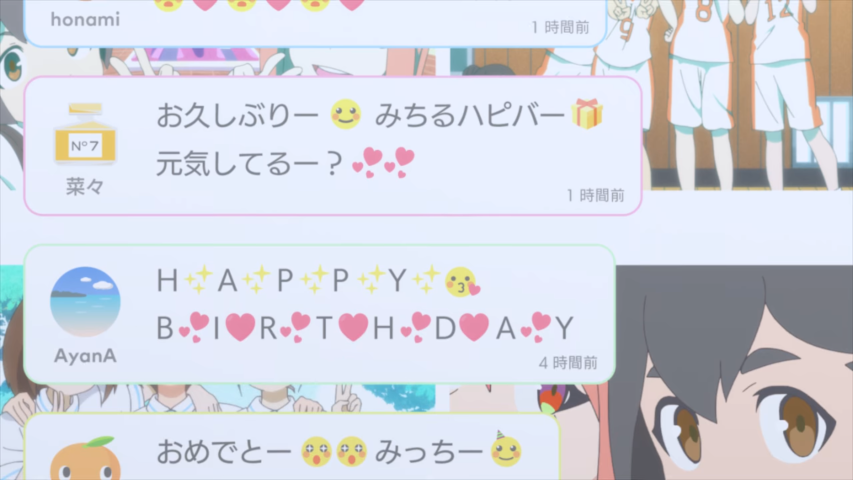
While talking, and thinking about how Michiru wants to go back ("It's just... I can't go back like this. But I wanna go back."), she is able to unwittingly transform back into her human form ("It's me! I'm finally back to the real me!"). Graced with a body that won't get her hunted down on sight, Michiru agrees to go to the mainland with Nina in order to attend a party Nina has been invited to by humans who don't realize she is beastfolk. The mainland is scary for her; the first thing they see is a cop, who Michiru is afraid will recognize them as beastfolk and harass them. But they are able to navigate to the party, and enter. Everyone inside is wearing masks to make themselves look like beastfolk.
Being unaccustomed to the rarity of beastfolk outside Anima City and the commonality of prejudice against them, Nina early on accidentally transforms into her dolphin form. Michiru is afraid that they will hurt her, but instead, they celebrate her. The host of the party brings Nina onto the stage and delivers a speech, about how Nina had endured so much hardship in her life due to being beastfolk, and that this party was in celebration of people like her. Except... Nina hadn't. She was the daughter of a wealthy mob boss who had never met a human in her life before that day, let alone a beastfolk hunter. Nina had never wanted for anything. And nobody bothered to ask Nina, let alone let her speak for herself. Someone comes up to Michiru and puts fake kitty ears on her, asking her if she forgot to bring her costume.
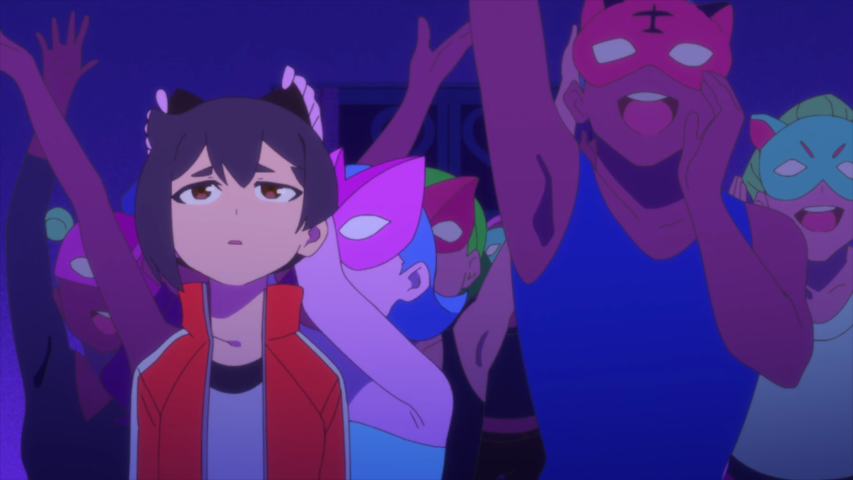
Michiru begins to look around and sees that, as much as people are happy to clap and applaud Nina, they don't exactly see her as a person. They have her do acrobatic tricks in the pool at the party, and enjoy the entertainment she provides, but that's all she is to them. Their reactions range from "bad ally" to "nominally supportive but will secretly talk in the bathroom about how the beastfolk are really 'half-animal' anyways so they're dangerous, we couldn't actually live around them, could we ladies?". We get Michiru looking at herself and her borrowed fake kitty ears in a bathroom mirror ("Seriously. What am I doing here?"), before getting a very angry call from Shirou demanding she bring Nina back to the beach to return to Anima City.
Michiru's sense that the people at the party do not see Nina as a person culminates as she walks out of the bathroom, finding Nina trapped inside a large aquarium with seemingly no exit. She is clearly drowning, banging against the wall of the aquarium, and the humans watch in confusion, doing nothing to help. The host of the party tells Michiru that they had put Nina into the salt water tank because she said she was tired ("After all, she's a dolphin, isn't she?"). Michiru tries to break her out, eventually resorting to transforming back into her tanuki form to break open the glass. No humans speak, continuing to watch awkwardly, as they help each other up and leave.
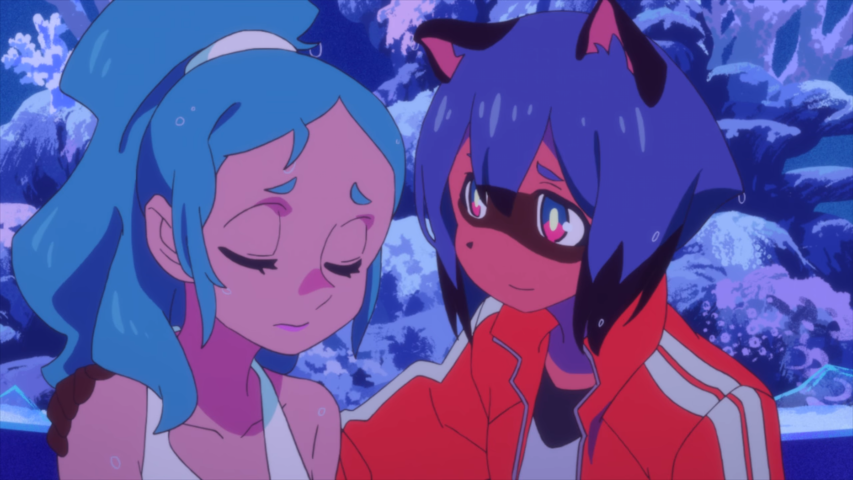
As Michiru and Nina ride back on Marie's boat with Shirou to Anima City, we get an opportunity to revisit Shirou's view of Michiru. When Shirou first called Michiru to get her to bring Nina back, his tone was very angry. And, of course, it's a serious situation; Flip, Nina's father, is threatening to bring war to the humans to get his daughter back. But, really, it doesn't make a lot of sense for Shirou to be angry with Michiru ("I don't care if you leave Anima City or not. Do what you want. But Flip's daughter needs to come home now!"). Nina could have come to the mainland with or without Michiru; she perhaps felt emboldened with a guide to the human world, but who would Shirou have yelled at if she had just gone on her own? In particular, the "Do what you want" sticks out to me, the signature of many a person who is upset about the actions another has taken but doesn't want to actually state it outright. It's not unreasonable to read into it that Shirou is upset with Michiru for leaving, and it would be a logical inference that Michiru is leaving as an act of rejecting her beastfolk-ness and a desire to blend in among the humans again.
Instead, Michiru returns on the ship with Nina. Shirou, sounding now somewhat confused and sheepish, asks, "I thought... You wanted to go back to that side." We get a longer speech in return from Michiru:
That's right. Someday I'm gonna leave Anima City. Except... not right now. I wanna know more about all the beastmen. I think it's my duty to know. So for now, I wanna stay in that city.
Michiru still sees herself as leaving Anima City and going back to live with humans some day. But, importantly, that "someday" is completely undefined. It's not tied to her being "cured". It's not tied to any amount of time. And I think, in the context right now that, she had come back as a human and just... didn't feel like she belonged until she transformed back to break Nina free, we see the beginnings of growth in her. In one sense, this scene feels like Michiru easing herself into thinking of herself as beastfolk. That "someday" is important to her because, she's not ready to commit to this new identity forever just yet. But she's also not outright rejecting it like she did at the end of "Rabbit Town".
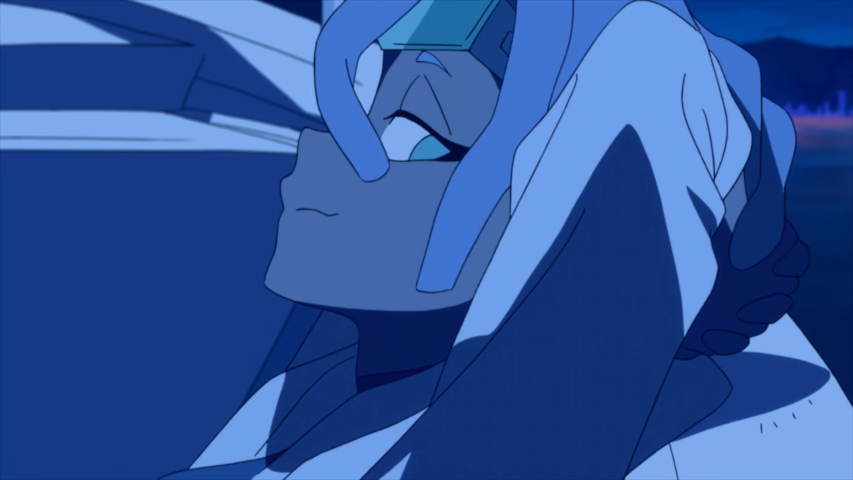
"Greedy Bears"
The next episode is by far the clearest view we get on Shirou's view of Michiru, and his personal ethos overall. It's arguably filler, if by filler you mean "doesn't advance the core plot", but is deeply important to understanding the characters of Michiru, Shirou, and Anima City as a whole. It also opens with what will be a recurring bit, Michiru explaining why she chooses to stay as a tanuki.
To step back a bit, again knowing that the studio has stated that keeping her in beastfolk form was an intentional choice as a visual shorthand to mark her as different from other beastfolk, it's easy to read this as just a justification they hacked up to continue that, now that she knows how to become a human. But it's also, intentionally or not, deeply resonant with my own feelings about presentation, and in talking with trans friends of mine, they echo this sentiment.
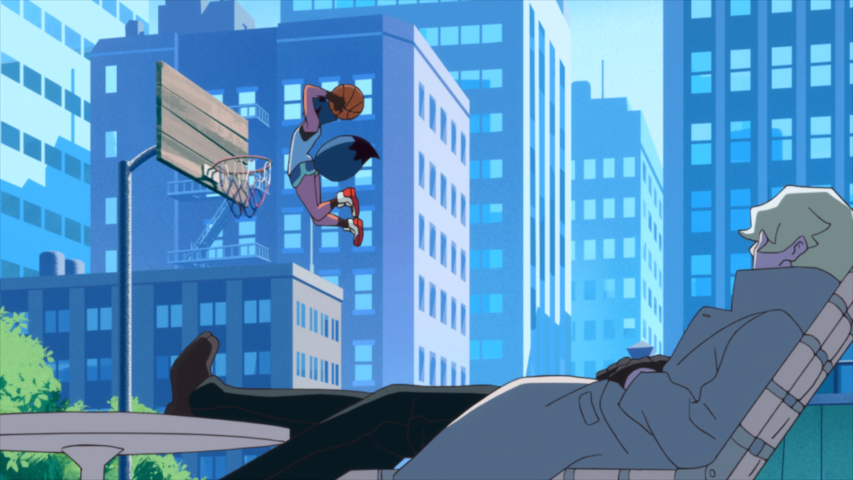
Shirou, lounging on a deck chair, is watching Michiru dribble and dunk a basketball.
S: "Aren't you able to turn back into a human?" M: "I mean, I can, but while I'm in human form I always feel like I'm in high heels. Y'know what I mean?" S: "Not a bit." M: "Meaning, being like this is way easier for me."
The way Michiru talks about being a human is like she feels like, as a human, things are just a little bit off. She has to put more mental effort in to do that because, it's not really natural for her. If she needed to, she could take human form again, but now, she's just more comfortable with herself as a tanuki. Being like that... just feels right, in a way that is difficult to really put into words.
This particular sentiment is repeated in the next episode as well. When Michiru meets up with Nazuna, they discuss Michiru's transformations:
N: "Michiru, are you unable to transform into a human anymore?" M: "Oh! I couldn't do it in the beginning, but I can do it now." N: "So then, why are you still in that form now?" M: "Uh, this way is a lot easier for me."
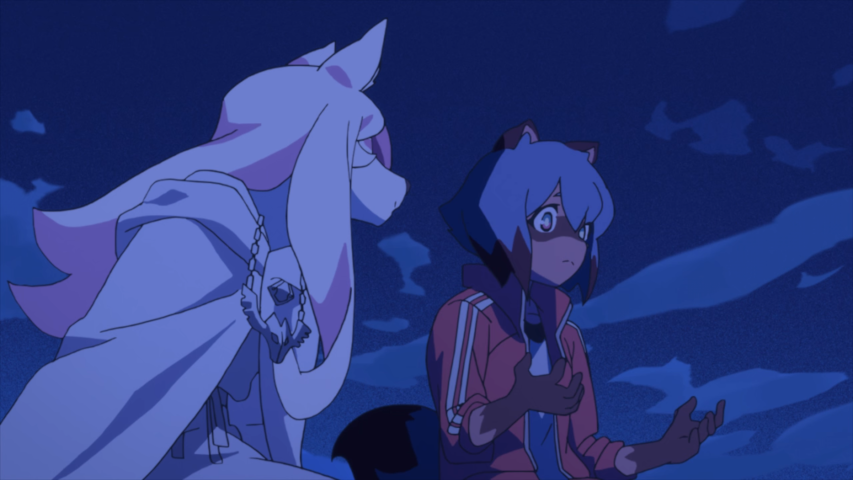
Michiru steers the conversation towards Nazuna visiting Michiru's room in the co-op after this, but again we have Michiru brushing off her tanuki form as just... easier. It fits her better. In the small ways that I can represent myself in more "coyote" ways (wearing a tail, a collar, similar), I find that I really struggle with the language to explain why it is I like and desire doing so. Though practically speaking it's not exactly easier (tails are hard to sit down with), it does feel like my body responds to it in a manner that I can never fully remember until I do it again. It does just feel natural. Other than the fear of people reacting weirdly to me doing it, it does feel... easier, like I slipped back into my own self in a way I had been separate from before. From my discussions with trans friends, I think there is a parallel here to being able to present in gender-affirming ways, and getting to express oneself in a way that feels more right, more comfortable.
And there's something else that happens for me, at least, which is, after the initial period of remembering how it is to have a tail, eventually, I just forget it's even there. I mean, I know it's there, I feel it, but, I don't even really notice it except as a natural extension of my body. To return to "Greedy Bears", Michiru describes a similar experience.
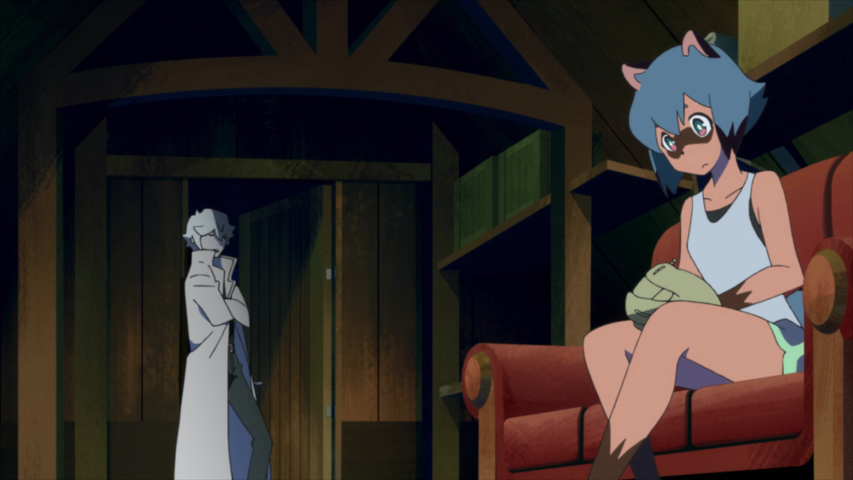
Michiru has begun playing baseball with the Bears, a team of lovable losers who live in the slums and are not so good at the game. But, with the help of Michiru and her transformative powers, they've been able to turn themselves around, winning games against 100-to-1 odds. The only catch is, she's not supposed to use those powers, and Shirou, who has been investigating the baseball league over allegations of illegal gambling, caught her. Now, he chastises her for her carelessness:
S: "Hey, gorilla tanuki. You promised not to use your power in front of others." M: "Uh, eh--" S: "What exactly will you do if someone finds out?" M: "I'm... not really sure..." S: "If they learn about your power to transform, you might have to leave before we can cure your 'Beastman-itis'." M: "But, the Bears! They're all so stupid but they love baseball so much! I never met beastmen like them before. Whenever I'm playing baseball with them I end up forgetting about my 'Beastman-itis'. [emphasis mine]
Shirou goes on to drill her over whether or not that makes her risking getting caught acceptable (and again, there's a difference here between the dub and the sub, where Shirou focuses instead on whether she wants to forget about her 'disease'). But again, Michiru is... comfortable. She talks about it as the first time she's had any fun since becoming beastfolk. And it's easy to see. She's excited, upbeat, just... naturally happy in a way she hasn't been.
Which makes what comes next in the episode take on a different tone. Shirou had to this point been investigating the baseball league to try to pin the Family for gambling, at the request of the mayor. The B-plot of this episode is him learning more about Dante, the coach of the Bears and the first beastfolk to play baseball in human leagues. The subject of severe persecution and harassment for it, Dante's career in the human leagues ends when he snaps and beats an opposing team bloody after the catcher and umpire harass him during an at-bat. It's... a heavy-handed and problematic parallel to, say, Jackie Robinson, but in order for the episode to also be a reference to Bad News Bears, the coach has to be a disgraced former great, so, we ended up here. But Shirou shows sympathy for Dante, even as he pointedly refuses to cooperate with Shirou's investigations.
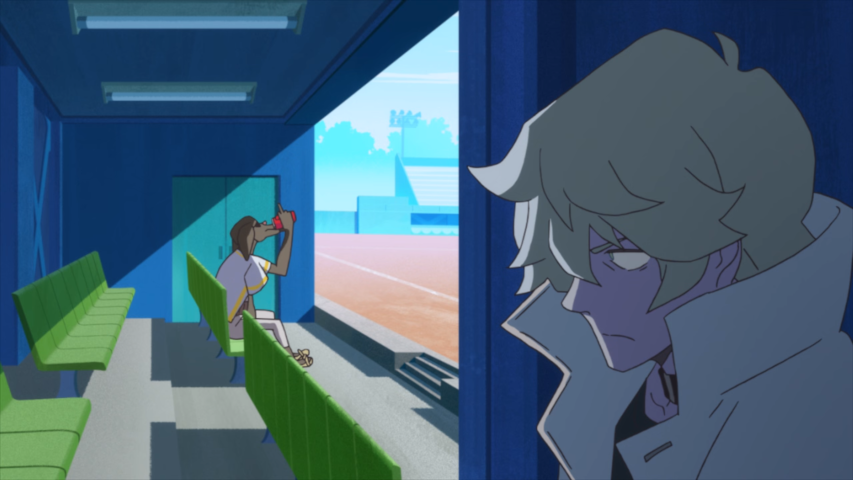
So, when this girl, who has continually denied being beastfolk, who behaves unlike other beastfolk, but is slowly coming to terms with herself, says that, for the first time, she doesn't feel like a human with a disease when she's playing, something flips in Shirou. She is one of Shirou's charges, and despite her acting rashly, potentially sparking a huge incident, Shirou can recognize that she really means it when she says it's the first time she's had fun or felt happy since transforming. She feels... comfortable. And he doesn't get it, but, if it helps her, he'll play along. Instead of trying to find proof of the gambling, Shirou runs around pulling strings so that Michiru's final game can go on unimpeded. He catches Dante attempting to abscond with stolen gambling money, and instead of arresting him, he gives him what he really was missing. Holding up a radio call of the game, as the Bears begin mounting a longshot comeback, he looks on as Dante begins to cry. Dante has a reason to believe in baseball again. Shirou takes the money back to the Family and stops them from interfering with the game or Dante, who has returned to the dugout to actually do his job. Shirou even makes a joke about having placed his own bet before walking off. All this, just so that Michiru can have one more game to feel comfortable as beastfolk. The episode ends with him returning to the mayor and merely saying he was unable to procure any proof of the gambling ring.
"Fox Waltz"
Despite these moments of comfort and happiness, Michiru still views her condition, unfortunately, as a disease, mentioning as much to Nazuna in the next episode. And we see it in this exchange with Shirou after he kicks Nazuna out of the co-op:
S: "Hold on. That friend of yours is-- She's a human?!" M: "Yeah, that's right. Nazuna has 'Beastman-itis', just like me!" S: *grimaces*
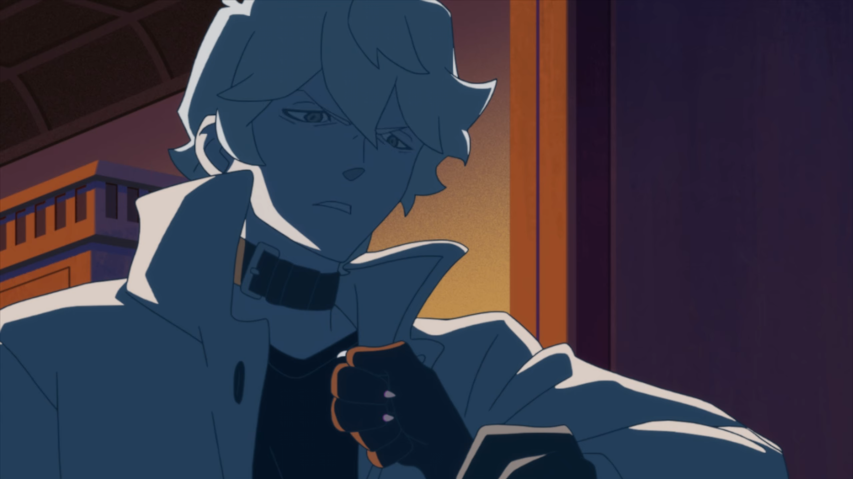
As Michiru senses, it's a weird moment. She follows up by questioning why she can live at the co-op but Nazuna can't, despite both being in the same situation. After all, Shirou seemed to be objecting more that she was a human than anything else; she doesn't know that Nazuna has stolen his identity. And it's a weird disconnect for Shirou -- why is that the first thing he says? It could be because he's deeply prejudiced against humans and it doesn't register for him that Michiru is one as well -- or, it could just be that someone proclaiming to be the Silver Wolf while also self-identifying as not even beastfolk herself is a special brand of fucked up. It's not stated outright one way or another, but I don't think either reading is out-of-place.
"Easy Albatross" / "The Mole Rat Speaks"
"Easy Albatross" and "The Mole Rat Speaks" have some interesting development in Michiru and Shirou's relationship, as Michiru helps him with new transformations she discovers she can perform. Shirou has good dad energy here, initially being surprised and angry or shooing Michiru away when she tries to help, before relenting and believing in her ability to help, like in this exchange:
S: "Wait, you can fly?!" M: "I've never done it before!" S: *angrily* "You haven't?" M: *apologetic* "No!" S: *grunts. smiles.* "Think you can get above [the albatross I'm fighting]?" M: "Leave it to me!"
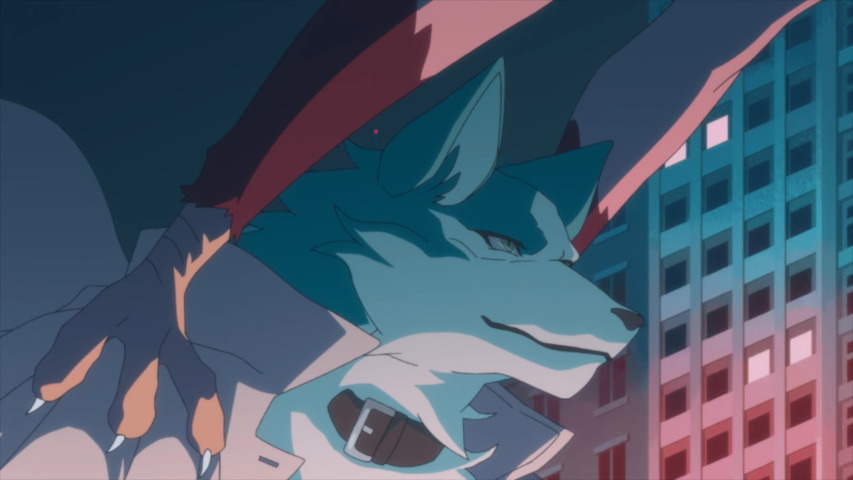
And in "The Mole Rat Speaks", the mayor explaining Shirou's backstory is a very big "I never tried to learn about my parents" mood. Michiru wants to tell Nazuna that there's a real Silver Wolf, and Shirou, despite knowing it will fail, is still cool with it, very much living out a "support your kid on the stuff they need to do for themselves" sorta ethic. Which culminates in him bringing a little treat and saying something comforting after she gets back home in failure. She doesn't even say anything to him, just looks dejected, and he sighs. It's what he expected even if Michiru didn't, and he thinks she's a little naive, but he doesn't want to see her sad. It's such a nice little moment.
"Human Scapegoat"
That brings us to "Human Scapegoat", where Michiru, despite being asked to stay away from the Church of the Silver Wolf and Sylvasta, ends up going to both. In the process, Michiru learns how she became beastfolk, and Shirou questions her when she returns. He had watched her, worried, from the rooftop as she got out of the van in the rain, but when he confronts her, he isn't mad. He's built up enough trust for her that he can believe she had a good reason.
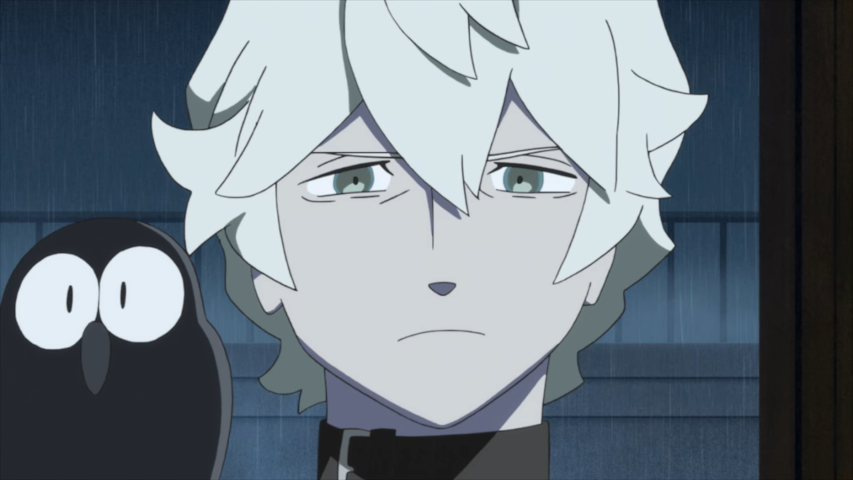
Michiru and Shirou discuss the news she has learned. Shirou calmly presses her on whether she thinks she can trust Alan to be telling her the whole truth, and Michiru starts to get heated over the implications he's raising. At this point, Michiru knows Shirou's history. She knows why he would talk like this. And, he's probing her a little, trying to see. Who does Michiru see herself as? The answer, more than anything else, is... someone who loves Nazuna:
M: "No, you're wrong! Nazuna isn't like that! Though, she is lying about being the Silver Wolf. Thing is, she's always said that she wanted to be an idol. I just figured she wanted to be an idol because she wanted to be loved, and, while there may be some truth to that, I think... I think what she really wants is for the oppressed and suffering beastmen of the world to have a little hope. And that's why she's doing her best to be the Silver Wolf. I can't help but be amazed by that. So, we should tolerate her Silver Wolf act. At least for a little bit longer." S: *weary, giving Michiru a hard look* "Have you joined the church as well?" M: "Hm? Of course not. I don't follow some phony religion. But I believe in Nazuna no matter what. A long time ago I came to the realization that that feeling could never be changed. But it annoys me, so I'll never say it to her face." S: *outwardly neutral, looking away* "Are you certain that you want to be a human again?" M: "Huh?" *looks over briefly* "Well yeah, I obviously do!" S: *sadness begins to creep into his voice* "If you do change back, will you leave Anima City?" M: *looking out the window, not seeing Shirou* "Honestly, I've come to love this city. It's just... I also miss my home more than anything." S: *looks down. Says with a short breath out* "I see." M: *still oblivious* "Yeah."
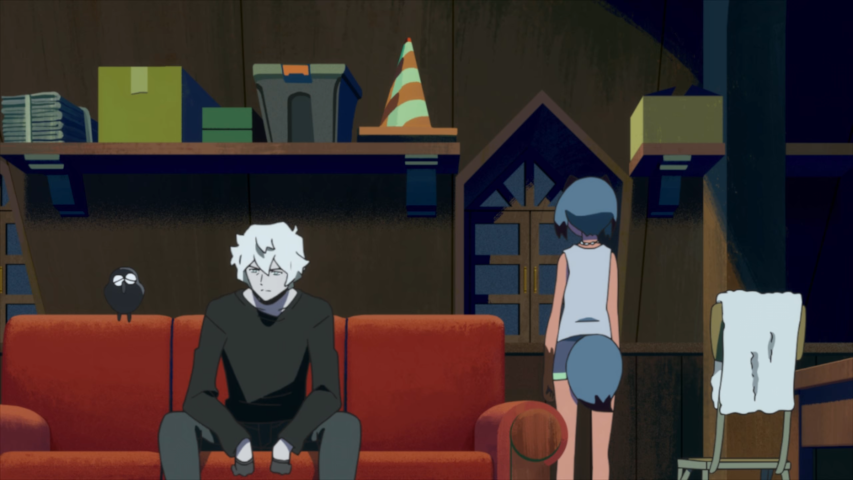
Michiru is talking through her feelings, and it feels like she's lying to herself a little bit. The ideal version of Nazuna is the one who is ultimately being altruistic, not narcissistic, so that's the version of Nazuna she tells Shirou about. She's still seeing herself as ultimately allied with Shirou, talking about how "we" should tolerate her Silver Wolf act. But she's completely missing the larger context of what Shirou is getting at. When he asks her about the church, she still sees it as ultimately being about Nazuna, not herself. When he pushes into what he's really saying, asking about herself, she just parrots back the same sentiment she had given before. She isn't really thinking about whether she wants to be human very deeply, she's just repeating her surface level motivations. But Shirou, respecting her autonomy and afraid to be further saddened by her rejection of her beastfolk-ness (and by extension, him), doesn't press further. It's clear how deeply it affects him. His next scene, the next day, he's still muttering to himself sadly under his breath ("So in the end, she's still a human.").
Mayor Rosé unwittingly plays into this as they discuss Alan Sylvasta the next day:
S: "I'm sorry, but I haven't met a single good human since the day I was born." R: *teasing* "Oh? But you meet with one all the time? Isn't Ms. Michiru a good human?" S: *grunts, looking out the window*
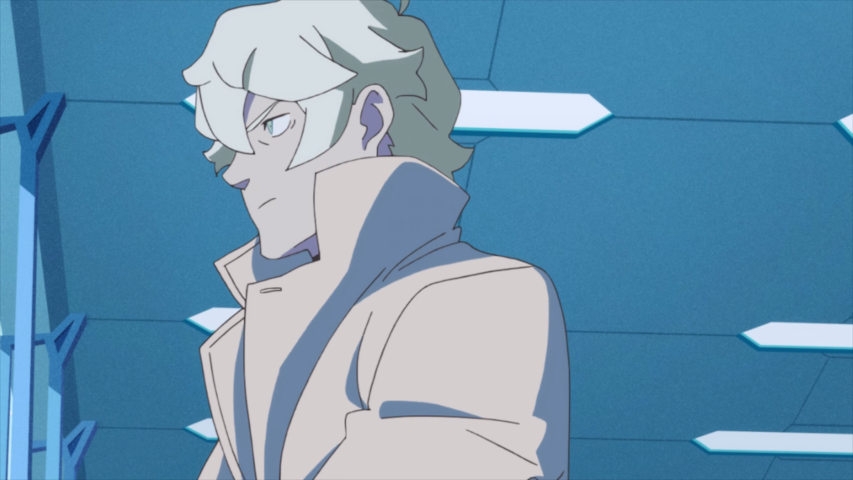
"Rabid Wolf"
This tension is directly played into in the next episode. "Rabid Wolf" starts with Shirou and Michiru teaming up to do something they've done before, subdue a rampaging beastfolk, and is largely uncommented on. The ease with which they conduct the operation shows how well they work together, even as there's no real banter to liven up the interaction. After the beastfolk is captured and taken away by strange robots, Shirou and Michiru follow them to Sylvasta, and end up confronting Alan over apparent illegal live-subject testing being conducted there. The problems start with this exchange:
S: "Hold on. So this vaccine that you're trying to develop is--" A: "That's right. It's a drug to turn beastmen into humans. The Beast DNA Extermination Vaccine stops beast transformation so they can't develop Nirvasyl Syndrome." M: "Does that mean... the drug would actually be able to cure my Beastman-itis?" A: "Yes, that's correct." M: *uncertain, breathless* "So it's real." S: "Then what you are doing is telling beastmen to stop being beastmen? YOU'RE JUST A HUMAN!"
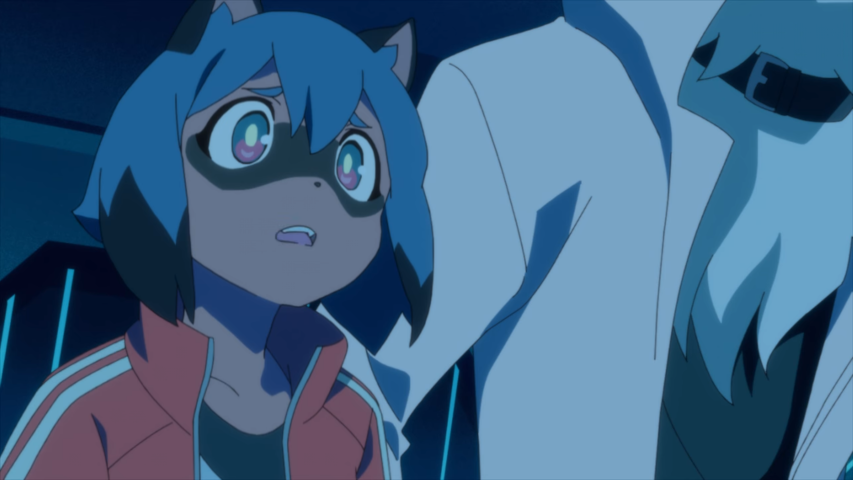
To this point, though "cures" have been talked about and promised to Michiru, they still never felt real to her. And while Shirou had tried to get her to contemplate how she would react to one, asking her if she still wanted to be a human, she answered really only at the surface of her thoughts. The cure didn't feel real until this exact moment. And suddenly, Michiru is forced to actually contemplate... what would it mean for her to be just a human again? What would it mean for her to stay beastfolk? What does she actually want?
Shirou attacks Alan, then tries to break the equipment delivering and manufacturing the vaccine. Michiru steps in to intervene:
M: "Stop it! I said that's enough!" S: "Why should I stop? There's no way I'll let a human create a drug that could eliminate beastmen!" M: "You saw it too though, didn't you? This person and Yaba both went out of control! You're okay with that happening to everyone, with them killing each other?" S: "Shut up! We turn into humans! And it's a human doing it!" M: "Yeah, I know, but it's still better to survive. If you go and destroy this place, then no one is going to be able to survive!" S: "Just move!" M: "I won't!" S: "You really want to be a human again that badly?!" M: *gasps, clearly caught off guard* S: "That's the only reason you want this drug to be made." M: *quietly* "That's not true." S: "You were only ever a human. You would never understand how a beastman feels!" M: "You're always like that. You always think you're right about everything! Of course I don't understand how the 1000-year-old Silver Wolf feels. Does living for 1000 years really make you that important?! During all those years, the only thing that happened was your growing hatred for humans!" S: "WHAT DID YOU JUST SAY?!" *growls intensely, then pulls himself back before cops show up*
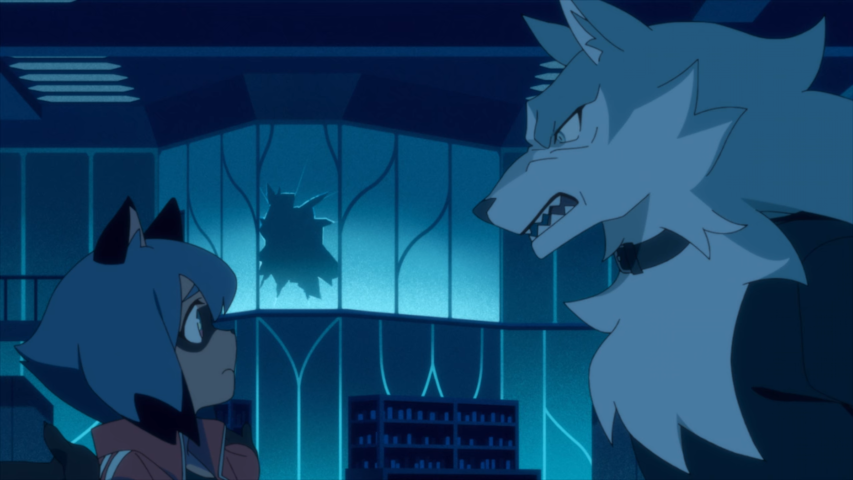
Shirou clearly could've made Michiru move if he was willing to. When he tells her to move, he's not arguing with someone he thinks he couldn't physically overpower. This fight, then, is only somewhat about the vaccine, as evidenced by him bringing back up the being a human angle. It's bringing to a head their entire relationship, and the way he feels rejected by her with that desire. But Shirou, despite being a social worker, is also a cantankerous, crotchety, stuck-in-the-past old man who can't always talk directly about his feelings. Instead, it is channeled into his rage and this fight. And to some degree, talking about the vaccine, he is justified; he immediately recognizes the vaccine as a vector for genocide against his people, while Michiru continues to be sweet-talked by Alan's calm demeanor and logic. The fact that she doesn't see that despite having learned about beastfolk and herself as one is deeply frustrating, enough to push him to his limit. But talking about Michiru...
She has been put into an impossible position. I don't think it's unreasonable that, to this point, the reality of a potential "cure" for herself just hadn't set in. And, really, what she needs is someone to be able to talk things through with, and to actually guide her through thinking through it all instead of just pointing her vaguely in that direction. Remember, she's a 17-year-old kid. Shirou has shown flashes of helping with this, like with the sweet he gave her after she tried to tell Nazuna about him, but they never fully worked it through. And the pressure of the situation doesn't let them back down and talk through things. Michiru doesn't know how she feels. Now that a cure is real, she has to actually interrogate herself about what she wants. And when Shirou says that she just wants to be a human, she's clearly hurt. For one, she's not just acting the way she is out of selfish motivations, but also, she doesn't even know if that's what she wants. The way she lashes back out at the end echoes the way she yelled at him at the end of "Rabbit Town", as well as the critiques Nazuna has levied at Michiru herself about not actually listening to the other person. And it's fair to point out that, really, neither Shirou or Michiru can hear the other's perspective right now.
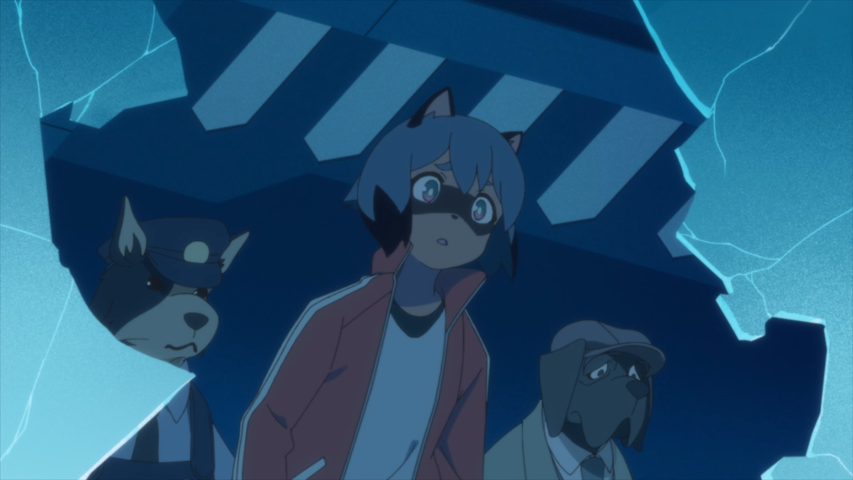
Michiru returns to the co-op, and just wants to be alone with her thoughts. But, in her way are Melissa and Jem, talking about praying to the Silver Wolf. Then there's Nazuna, finally being friendly to her for the first time in the entire show. And in the conversation they have, it's clear that the fight is still reeling through Michiru's mind:
N: "Mmm. As long as you're alive it shouldn't matter whether you're a beastman or a human, right?" M: *refusing to look up* "I guess that's true. But Shirou clearly doesn't see it that way."
We see, in this argument about whether the genocide of the beastfolk culture will be okay because "at least they're still alive", a Michiru who is finally turning the gears in her brain about her own feelings. She had believed that it would be okay, she had believed that she wanted to be a human. And she indicates as much. But her answer is, really, noncommittal. Shirou's words still weigh heavily on her. She isn't decided on how she feels about herself. She needs time to process what just happened.
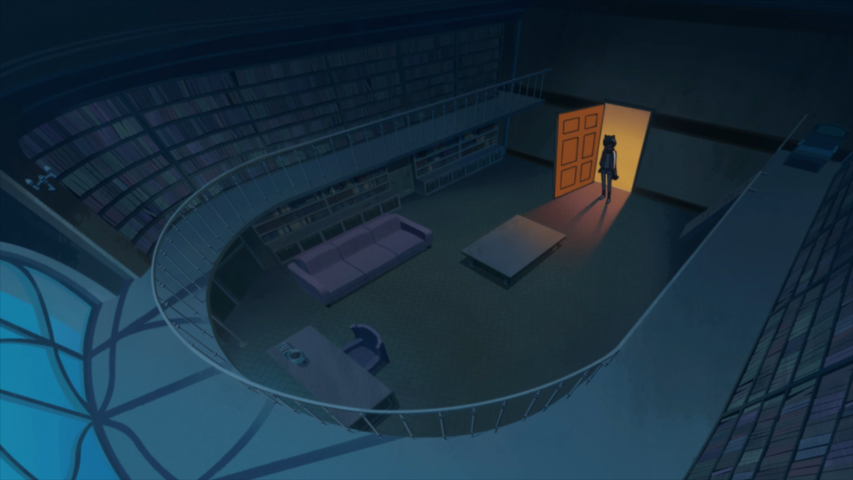
It's no coincidence the first thing she does once she's alone is go to his office. She wants a chance to understand, to have the full conversation they didn't get to have. She wants a chance to maybe take back some of what she said. She falls asleep in the office, and in the morning, Kuro goes nuts as Rosé is taken into custody at the Prime Minister's residence. Michiru wakes up, hoping Shirou is back ("Where is he? That stubborn old man." *face shifts from a stubborn, slightly angry look to a more sad one*).
"A Beastly Feast"
As preparations ramp up for Nazuna's concert in the next episode, Michiru questions the logic of Nazuna's confession multiple times, but ultimately lets it go. She thinks she sees Shirou at the concert, then sniffs him out with a canine nose, finding him atop the stage rigging. And there, they can finally reconcile:
M: "I'm sorry! I know that I'm the one who's supposed to understand more than anyone why you care so much about the beastmen. I was a human and then I turned into a beastman. I know the fear of not being able to... to be yourself! But still! I never really noticed how you felt, and I'm sorry for that." S: "Listen--" M: "But whatever it is you're trying to do right now... I don't understand it, Shirou! Why did you have a gun? Just tell me what's going on! Help me understand! You know that Nazuna is my friend, don't you? So why? What are you going to do to her? Tell me!" *unable to look Shirou in the eyes* S: *gently takes gun from her* "I'm sorry." M: "Huh?" S: "The truth is I don't want to hurt your friend. But this concert has to stop! Because, I can't let that confession happen. If their leader reveals that she's a human, then it's going to trigger Nirvasyl Syndrome. S: *beat* "Do you know when she's planning on revealing it?" M: *wavering voice* "Is the confession really gonna trigger it?" S: "I'm positive. The beastmen are stubborn. They're more emotional than humans, and they hold strong beliefs. If they learn they were lied to by someone they trusted, there's no question it would be a huge shock to them. They'll go out of control." *looking away from Michiru* M: "You mean, the truth is the opposite of what Alan told Nazuna?" S: *turns to Michiru* "Alan is doing this on purpose." M: *gasps* "But why would he?" S: "I don't know. But for now, we have to stop the confession. Can you... try to convince her?" [emphasis mine]
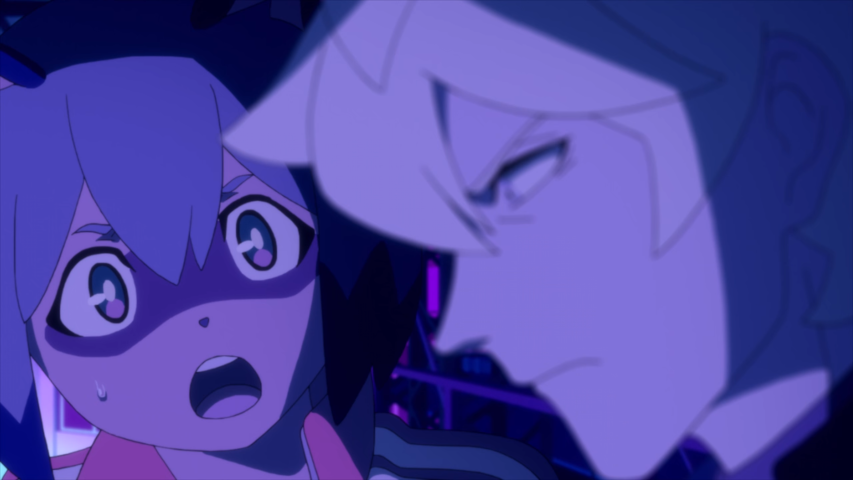
It's... a little too tidy, but both get a chance to apologize. They don't talk directly about the fight, but Shirou's words about being lied to by someone they trusted applies to him too. It's unfair of him, but he felt hurt and lied to by Michiru when he felt her rejecting her beastfolk-ness and rejecting him. He very nearly did lose control in that fight. In 1000 years of living, no one, not even the mayor, has been able to elicit quite that kind of response from him. Further, in the next episode, the realization that he has hurt and possibly killed Michiru causes Shirou to erupt in a mournful howl. Clearly, Shirou cares about Michiru. And Michiru demonstrates that, she is beginning to understand. She understands and can speak to the actual thing she was wrong about in the fight, the way Shirou was concerned about the beastfolk's identity being destroyed. And it speaks to her own thoughts, evolving even now, on who she is herself. Michiru is quick to believe Shirou, but it's because she already had misgivings on the whole confession issue.
"Anima-City"
The confession, though not given by Nazuna, still happens (more of an outing, but we'll come back to this). Nirvasyl Syndrome still takes. A cure is discovered, but the gang needs to buy time to be able to synthesize it. As the beastfolk take to the streets to fight off the machines deploying the extermination vaccine, the OP music starts. Michiru, Nazuna, and Marie return to the concert grounds to hijack the broadcasting setup there, which will keep the Nirvasyl sufferers from rampaging. The lights on the stage, pink against blue, flick on. Alan taunts Michiru. And as the music crescendos, Michiru delivers her manifesto.
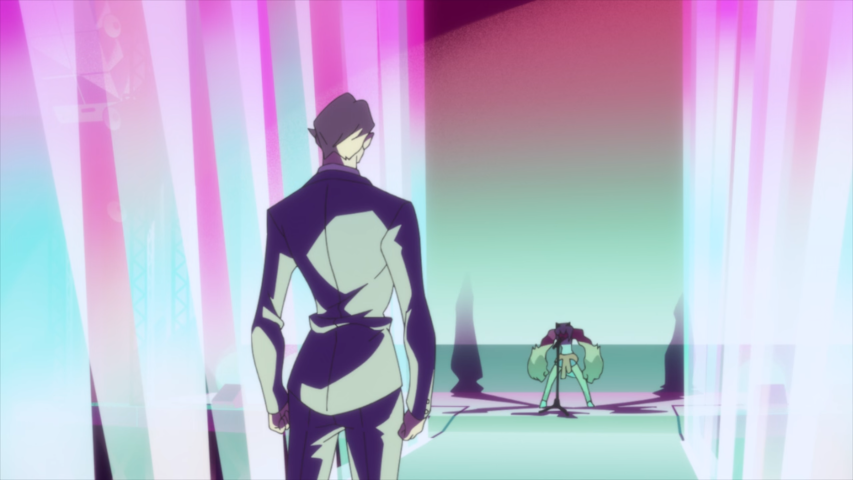
A: "I don't know what you're up to, but honestly, just take a look around you! Anima City clearly can't be saved. The beastmen are going to kill each other before your serum is ready. And as for anyone who's actually able to survive, well, the extermination drug's going to turn them into a human." M: *jumps onto the stage, at the mic* A: "I must say, those arms really aren't a fit for a girl. Not very ladylike! But regardless, you're a human,so why don't you hurry up and transform back so you can live a normal life?!" M: *amplified by microphone* "Because whether I'm a girl, or whether I'm a beastman, or a human, it doesn't make a difference! I'm going to decide for myself what's normal! I'm going to decide for myself how I'm going to live and even what's 'ladylike'! If there are beastmen who want to become human, then they should become human. But what you are doing, is wrong! It's disgusting! You can't! Take away! THEIR RIGHT TO CHOOSE!" *throws mic stand*
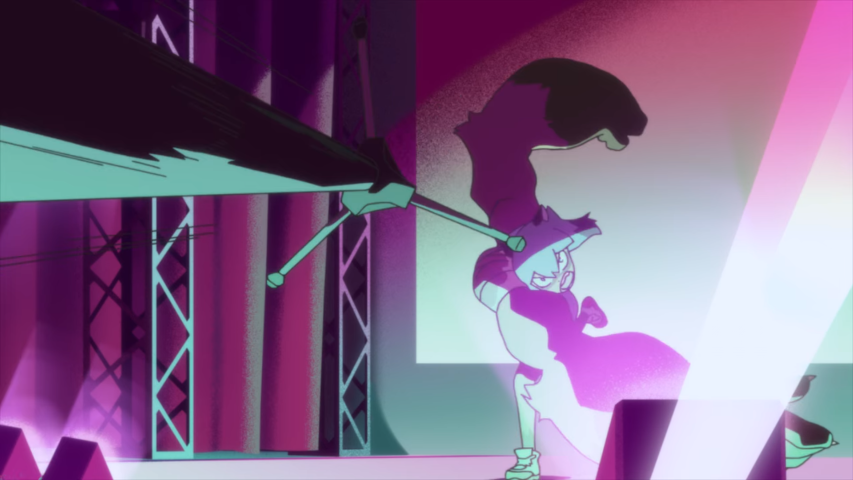
And that is the culmination of Michiru's character arc. Alan is a dick, Shirou beats him up to protect her, and then the story is pretty much over at this point. And while I've gone back and forth on whether I think... this story, with this message, was quite the intention of Studio Trigger, it's kinda hard not to look at this scene and think, "I don't think it's trying to be very subtle here." The set up with the "arms not being a fit for a girl" bit. The payoff, with the "I decide what's normal, it's my right to choose my own body" bit. She throws the fucking mic stand. Do I have to belabour the point here?
We get a final exchange between Shirou and Michiru, after the action is over and the issues have been resolved, and it tells us a lot about where they ended up in terms of their internal feelings.
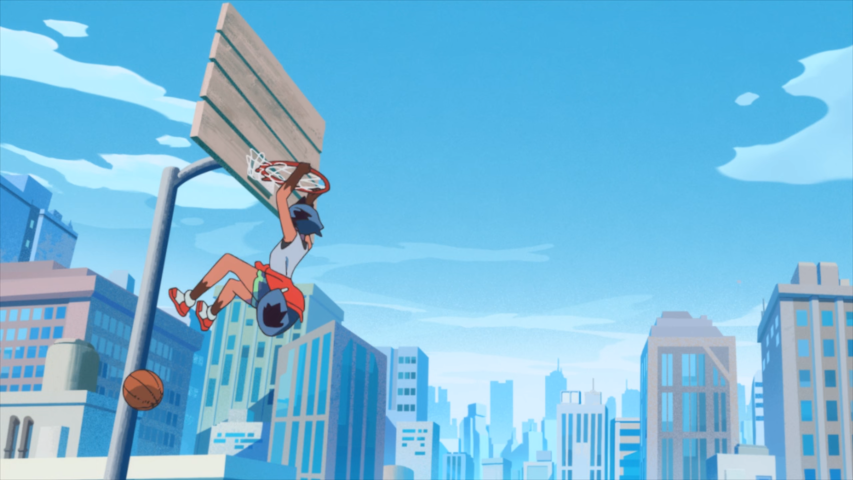
S: "I want to apologize for everything." M: "It's not your fault, don't you know." S: "They're creating a medicine for your Beastman-itis. That's good, right? You can go back home now." M: "I'm fine with things the way they are. I'll stay here for a while." S: *looks at her* M: "Nazuna and I are the only ones who've experienced being both human and beastman. I'm sure there are things only I can do because of what I am." S: *grunts softly, an unreadable expression on his face* M: "And plus, I like myself, the way I am now." S: *smiles* "What are you going to do in this city?" M: "I haven't really figured it out yet. But I'll find something no one can do except me. I'll play basketball. And help Nazuna out too! Oh also, I'll help you too, of course!" S: *wry smile, teasing voice* "You know I never asked you to help me, right?" *singular chuckle* M: *laughs* "Hey, you know the night I first arrived in this city? I actually saw the Silver Wolf." S: "Huh?" M: "And you know something? You were really happy at that festival, Shirou. That's why you celebrated in Silver Wolf form, right?" S: *confused look, blinks* M: "But, from now on, we can choose what form we want to be in anytime!" S: *smiles as Michiru gets called away* [...] S: "Maybe things can change. And maybe this city can too."
Directly, Shirou is apologizing for having hurt Michiru's shoulder, but of course, there's a lot more he feels he has to apologize for. And in particular, he understands that, if Michiru wants to be a human, it's her choice; so, with some uncertain enthusiasm, he prompts her about it ("That's good, right?"). He's not sarcastic, or bitter, just... wants her to be happy, genuinely. But Michiru, given her speech at the concert venue, knows who she is now. And she's, maybe different in some ways from other beastfolk, in the ways that no culture is a monolith. But, she's beastfolk. She likes herself, the way she is. She's fine with how things are, she wants to stay in the city and live her life. She wants to keep up this relationship they have formed. She has come to accept who and what she is, and her identity.
And, importantly, and subtly, Shirou only smiles when she says she likes herself. Not when she says things that imply she wants to stay a tanuki, not when she talks about the utility of staying a tanuki. Only when she genuinely affirms her happiness with this decision. Like before, Michiru hedges; she'll stay in the city for "a while". But again, it's completely undefined. It doesn't even really feel like a hedge so much as, the sort of thing you say when you know you can't perfectly predict the future. But she gives Shirou something to think about in terms of how he presents himself (seriously, why not just always be in wolf form?), and flies off.
Some notes on things that don't work so well if this story is a trans one
There's a few sour notes in this that, I bring up mostly so I don't get people tweeting at me that I forgot them and "oh isn't this shitty?" I think, in pointing them out, we can discuss briefly why they're problems, and how we should account for that as we understand the text. There's probably more that I'm either forgetting or just missed (and if pointed out, I can add them here, in the spirit of "I know this isn't quite my lane and I want to make this document not be harmful/be of potential help to others"). But I'll talk briefly about the ones I did pick up on, at least.
Early on, when Michiru is first talking about being a human as Jem administers the beastfolk test to her in the co-op, they talk briefly about something they call "Human Delusional Syndrome". Specifically, Jem says, in response to Michiru asking if anybody else has ever transformed from being a human to beastfolk, "I have heard talk of 'Human Delusional Syndrome' catching on lately, we could have you admitted—". The implication here is, there are some beastfolk who... identify as humans, or think they are humans, or... something. And the response of this society is to put them in a mental hospital? While there are some parallels to the way our own society has responded to trans folk in real life, touching upon issues where you may accidentally imply that trans people are "delusional" is, at best, something to be handled very carefully before you stumble into saying something very harmful and shitty. In the defense of the show, I think Michiru's final speech including a note that "If there are beastmen who want to become human, then they should become human" goes some way to rejecting the shittiest possible reads on that bit (that the story believes it is accurate), but that doesn't come until the very last episode, and all we really get in this moment is Michiru being upset at being called crazy and Jem dropping the issue. Which is... not as large a refutation of that claim as one would hope.
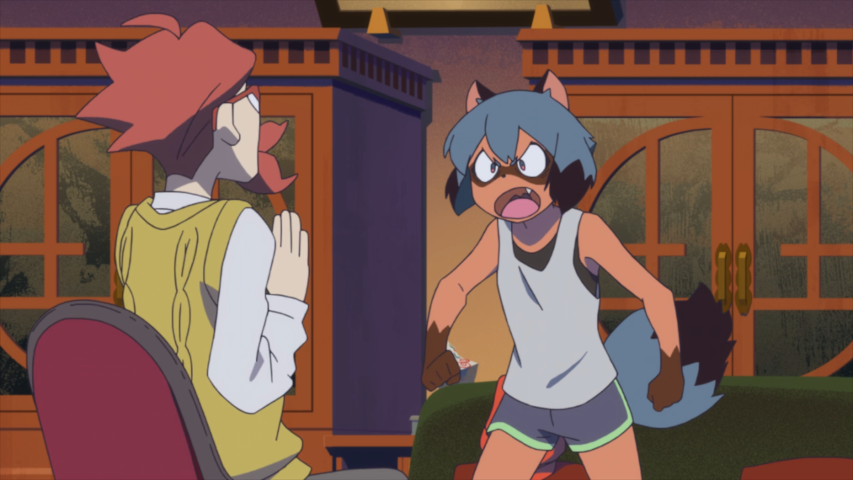
Were we to consider how the concept of transness that I'm arguing is present with Michiru applies to Nazuna, then we have the problem of how to deal with her name. Because, though Nazuna is Nazuna before the beginning of the show, and by the end of the show, in the middle, she's Déesse Louve. And Michiru absolutely can't accept this new name, refusing to call her by it. Again, this can be a problem that trans folks experience when choosing names they find to be more appropriate (and it's a problem I experience on a less impactful level myself with my parents, who call me by my birth name, rather than what I more commonly go by); to argue that this doesn't exist is misguided. But the text of the show is a little muddied on this point particularly because Déesse Louve is a show name. Nazuna goes by it with everyone, but it's also a part of her persona as the Silver Wolf, and she seems to just be putting it on as an act. This is particularly exemplified by the fact that, by the end of the show, she's back to just being Nazuna again. The new name was just a "fake name" which... has problematic implications if this were to map to trans peoples' experiences in the real world.
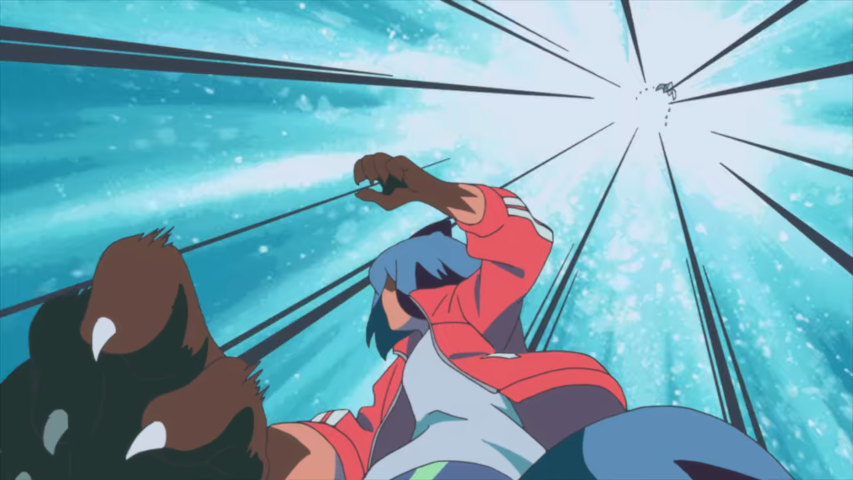
"A Beastly Feast", with the concert, focuses its plot on the outing of Nazuna as a human. Whether this is considered an outing or a deadnaming or something else, once again, I get it, those are things that happen in real life. They're just, especially in this sort of manner (being outed on stage in front of thousands of people), very traumatic events. It just kinda feels shitty that the plot had to revolve around that -- even if logically and mechanically it works, that sort of thing can feel like making a punchline out of people's suffering if not handled deftly. Particularly considering that, although it sucks in the moment and it's apparent that Nazuna is unhappy with having been effectively a pawn, it's never really dealt with in much of a serious way.
Finally, after the final action happens, Michiru gives a short voice-over narration to Shirou's howl and a sort of epilogue for the story. It starts with this:
At that moment, I knew. Nazuna and I will always be different from them. But we were still touched by the sadness, the heartbreak, and the care for others that was expressed in Shirou's howl.
I think it particularly undercuts the message that Michiru is, at her core, beastfolk. Of course, there are differences between folks. To talk about trans people, it's certainly not the case that trans women and cis women (or trans men and cis men) have identical experiences and are in every way the same. But I think it's weird to give such focus on the separation between these groups when the core of the message isn't really exploring those differences and what they signify. It's just talking about the way Shirou's howl spoke to them, even if not in exactly the same way as the other beastfolk; to go out of their way to make the point that they are different here just feels unnecessary.
So where did we end up?
Michiru is a trans character. Now, she's not a trans woman or non-binary or anything else, she's not trans at all in terms of gender. She's trans in terms of species, in the way that, though she was born a human, she comes to recognize herself as a tanuki, while her body undergoes these changes directly. Given that I'm a therian, I think it's pretty easy to see why this could resonate so strongly with me, but I think the specific trans-ness of her character does still hold parallels with the experiences of non cisgender people as well. And I think the show, whether intentionally or not, ends up making reference to gender when it touches on these trans topics.
While the show highlights this transness in many ways, I think perhaps the most interesting lens with which to watch it develop is through the pseudo father-daughter relationship that Shirou and Michiru develop over the course of the show. As Studio Trigger and the show demonstrate, Shirou is in many ways stuck in the past and in tradition, as many other beastfolk in Anima City are. And the ways that manifests in their relationship and Shirou's response to Michiru's transness are interesting to watch and see develop. I think, in particular, where Shirou and Michiru end up in that relationship is particularly sweet, and Shirou's acceptance of Michiru coming from her own acceptance of herself is a really nice moment.
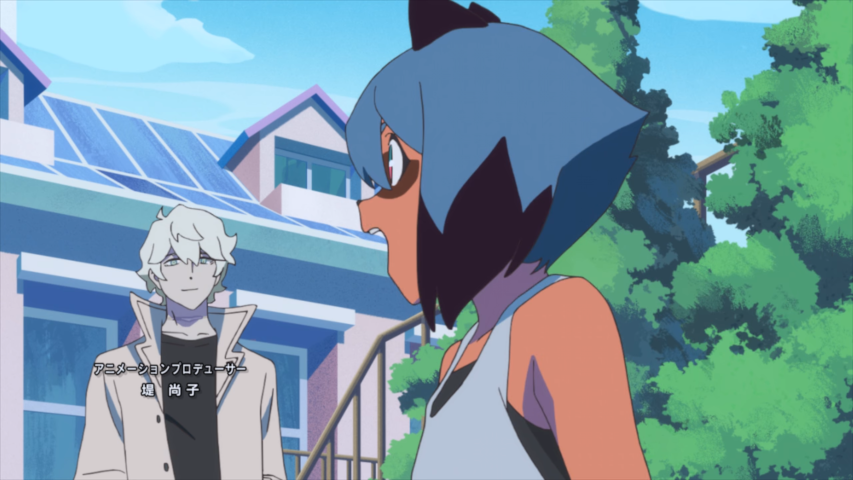
If you watched BNA and missed this, I don't blame you. As I pointed out, for various reasons I was primed to notice it more than, I think, many others, and also I think it's worthwhile to point out that a lot of it is subtle and hard to notice. It's buried in voice acting, or small moments in animation, or things like that. Animation, particularly Studio Trigger animation, is typically bombastic, exaggerated at least a little to convey more clearly the emotions and feelings of characters. To move away from that towards these little moments... whether it works or not depends on the person. But I would claim that, were it not for the fact that there simply is no good way to communicate "animal people" outside of animation like this, there are many elements to this where it feels like people are more accustomed to looking for the types of thing the show does with live actors. Whether it would be "better" or not, I couldn't say, but I think it would be less difficult to notice under that condition.
I would say that BNA is an exceptionally crafted story of character. I go into more detail about everything else about the show in other posts. As a final call to action, I'd ask you to consider yourself what it is that you find most compelling in stories, whether that be the overall narrative and high concept ideas, or the world building, or character development, or even something else. These all form different facets of "story", and it's important to recognize them individually. When I say how much I love the story of BNA, it's true, I don't really mean the overall plot -- it hits good beats, but overall has some significant flaws. Instead, what I mean is Michiru's character arc and her relationships with the people around her. And that's still a part of the story, even if not the bit I typically jump to first when I hear the word "story".

Comments
Feel free to share your comments here. I approve each comment before it becomes visible. Sorry if this doesn't happen quickly; I have other stuff going on sometimes. Use common sense about what to post; no racism, no sexism, no homophobia, no transphobia, and so on. Be good to each other, that is. If you format your comments in Markdown, they will be rendered when they get put up on the site (though some features, like images, are not supported).
make comment
Stan (2020-08-28T23:36:25.000Z)
In the "Some notes on things that don't work so well if this story is a trans one" section, I talked, briefly, about… things that were, in a word, imperfect, if we were to interpret the story as being fundamentally trans. Deadnaming and that sort of thing, particularly. I don't know that I would take back anything I said or that I have updates so major as to constitute adding to the piece itself, but I think there's relevance in a piece of the discussion in this review of "Tell Me Why", a game about a pair of twins (one of whom is trans) grappling with memories of their mother and the town they grew up. In particular, the author, Dia Lacina, talks about the tension between telling safe stories and telling authentic ones:
The full piece goes more in-depth into this thought, as well as discussing how the game (doesn't) deal with indigeneity very much despite the twins' adoptive father being Tlingit. I found it an interesting read despite the fact that I wasn't all that interested in the game itself, just as a commentary about wider cultural issues. But, I would say, I think there's a wider discussion to be had about the topic of how to approach stories that may be… authentically messy.
reply